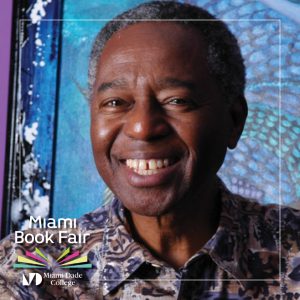
Mervyn Solomon is a longtime Friend of the Fair who has contributed to our work in more ways than one. A native of Tobago and the son of a Methodist school headmaster, he lived in Trinidad and then Canada for a time before coming to Miami in 1983.
Tell me a bit about your life in Tobago and Trinidad.
I shifted back and forth, but did two years of high school at Bishop’s High School in Tobago before moving to Trinidad and graduating from Queen’s Royal College, known as QRC. I had a love of literature and learning – my interests were history, Latin, and English lit – and both places brought that out. There was also a bookstore close to QRC, owned by a Barbadian, where I got exposed to books of different kinds. We’re talking early to mid-1950s, when the whole Colonial upheaval was beginning to settle in.
He carried many books, as well as local and foreign newspapers – British papers, The New York Times – that complemented what I was learning at school, where my teachers were from Great Britain, Ireland, Barbados, and Trinidad of course, and their backgrounds were diverse as well. Chinese, Italian, East Indian, Black … the international flavor with which I grew up, though I wasn’t conscious of it at the time. I very much remember my Italian teacher, because he was living in Berlin during Hitler’s movement before he left the country. He told us of his experiences there, and how he would be in his apartment looking down at the street where the Nazis were marching. That fascinated me – that firsthand account of history.
It was at the bookstore that I discovered The Rise and Fall of the Third Reich; I was about 16 or 17. I read it and didn’t sleep for about two weeks. That’s when I first understood what the Holocaust was, and understood the impact that books can have.
What other books and writers did you discover at the bookstore?
I got to know Caribbean writers, including two that stood out for me: George Lamming, who died two years ago, and V. S. Naipaul, who won the Nobel Prize for Literature. He actually came to the Fair. They were important to me; Lamming wrote about what it was like for a Black West Indian kid growing up in a colonial society, and Naipaul at the time treated the East Indian element in Trinidad and Guyana and what that would be like.
How did you land in Canada?
I moved there when I was about 25 or 26; I went over as part of the Trinidad and Tobago public service, in the public health sector. Then I shifted to finance and planning, usually as a clerk. I was nurtured by some of the best, most caring people who were nationalistic in their outlook. Government service is a noble thing. I still feel that way.
And you actually ended up teaching.
Yes, I taught history in a small town called Stayner for about four years, then moved to Brampton to work at a vocational school for students with disabilities. That was a joyous experience. After that I went to library school.
Then you moved to Miami.
My wife at the time, this was my second wife, worked for the Trinidad-Tobago tourist board in Canada. When the opportunity for her to be posted in Miami came up we thought, well, this would be an interesting thing to do, live in the United States. So here we came. I eventually joined Miami Dade College as a librarian at the North Campus and also was a part-time associate professor teaching reading and writing skills. I stayed with MDC until I retired seven years ago.
So you were at MDC and moved here the year before Book Fair began – how did you first hear about it?
The very year I went to the college I met a new friend who asked me if I’d be interested in Book Fair. He mentioned Mitchell Kaplan’s name and that’s how I met him. Right away I said it would be a good idea to create some space for Caribbean writers – Mitchell was open to the idea and I started to do that.
Wow, what an amazing connection to have to the Fair!
Yes, there wasn’t any such thing as a Caribbean presence at Book Fair back then, and I can’t tell you who we first invited, but I used my ingenuity [laughs] and thought about the people I knew who were here but from the islands. There were just a couple of people the first few years, but we were able to invite more and more writers.
What are some great books – written by Caribbean writers or not – that you’d definitely take with you if you were headed somewhere for a long solitary trip?
Derek Walcott’s The Star-Apple Kingdom, Earl Lovelace’s The Wine of Astonishment, and Chinua Achebe’s Things Fall Apart.
You’ve been going to Book Fair for many years, and you’ve been a Friend a long time, too. What most resonates with you about those things?
What I love most is that the Fair lets you see Miami at its best. Things like friendship, kindness – just people meeting each other and that feeling of community. That keeps me enthused about it to this day.
Interview by Elisa Chemayne Agostinho; responses have been edited for space and clarity.